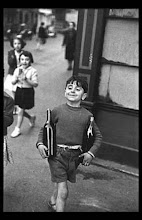
I recently finished a book by Annie Dillard: Teaching a Stone to Talk. Really, it is a collection of fictional essays of experiences and the thoughts that followed minutes, and sometimes, years after. A particular essay entitled "God in the Doorway" earned a position as one of my favorites.
Dillard describes an experience as a young child. During the Christmas season, Dillard's neighbor, Miss White, would dress up as Santa Claus and come to her family's front doorway. "Like everyone in his right mind, I feared Santa Claus, thinking he was God" she recalls. Consequently, Dillard in her young mind saw a "vulnerable trinity": God, Miss White, and Santa Claus. During the other seasons Miss White would have Annie over for there mere pleasure of company. The summer following the "Santa visit" Miss White and Annie were outside with a magnifying glass. Then, Miss White lifted Annie's hand to focus a ray of sunshine on her palm. It burned, and Annie ran away crying.
It is the last two paragraphs that grabbed my attention the most, and I cannot paraphrase them accurately so I must write them out. They are the following, read carefully:
Even now I wonder: if I meet God, will he take and hold my bare hand in his, and focus his eye on my palm, and kindle that spot and let me burn?
But no. It is I who misunderstood everything and let everybody down. Miss White, God, I am sorry I ran from you. I am still running, running from that knowledge, that eye, that love from which there is no refuge. For you meant only love, and love, and I felt only fear, and pain. So once in Israel love came to us incarnate, stood in the doorway between two worlds, and we were all afraid.
Dillard describes an experience as a young child. During the Christmas season, Dillard's neighbor, Miss White, would dress up as Santa Claus and come to her family's front doorway. "Like everyone in his right mind, I feared Santa Claus, thinking he was God" she recalls. Consequently, Dillard in her young mind saw a "vulnerable trinity": God, Miss White, and Santa Claus. During the other seasons Miss White would have Annie over for there mere pleasure of company. The summer following the "Santa visit" Miss White and Annie were outside with a magnifying glass. Then, Miss White lifted Annie's hand to focus a ray of sunshine on her palm. It burned, and Annie ran away crying.
It is the last two paragraphs that grabbed my attention the most, and I cannot paraphrase them accurately so I must write them out. They are the following, read carefully:
Even now I wonder: if I meet God, will he take and hold my bare hand in his, and focus his eye on my palm, and kindle that spot and let me burn?
But no. It is I who misunderstood everything and let everybody down. Miss White, God, I am sorry I ran from you. I am still running, running from that knowledge, that eye, that love from which there is no refuge. For you meant only love, and love, and I felt only fear, and pain. So once in Israel love came to us incarnate, stood in the doorway between two worlds, and we were all afraid.
As I learned in the oddest of places, amongst elementary aged children, Christmas is the time to celebrate the arrival of Christ. I have never thought of it that way. What I mean is, not that I have not thought about the birth of Christ and arrival in that sense, but arrival as in God...coming to earth. I don't know if that makes sense, or if there is a distinct difference between the two thoughts. God is complex, if you do not know. I could go into why he came, and what not, but I am neither adequate, nor patient, enough to keep going. Although, I believe we are still afraid. Making Christmas about presents, which can be linked to the "gift" of Christ I suppose, but really...is that why we give? New ideas always turn up in the holiday season and new distractions as well. Afraid? I believe King Herod, in the bible, was afraid. I believe that's why he created genocide for those under the age of two. He did not want to be "burned".
I now realize where the misunderstanding begins. "For you meant only love, and love, and I felt only fear, and pain." Too many times, Christ's love is overcome by the thought of God's judgment. In Colossians, Paul reminds Christians that what ties together the virtues of Christian living in perfect unity is judgment. No, sorry, not judgment, LOVE. Are those who are afraid, afraid because of Christians? Now, I've hit another point where I could go on about Christians in the 21st Century and how we should be living, but, again, I am neither adiquate, nor patient.
In closing, if I can call it that, I want to encourage you not to be afraid, and not to make others afraid of the season of Christ's arrival...of Love's arrival.
